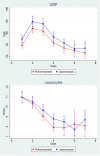Improved perioperative outcomes and reduced inflammatory stress response in malignant robot-assisted colorectal resections: a retrospective cohort study of 298 patients
- PMID: 34022914
- PMCID: PMC8141231
- DOI: 10.1186/s12957-021-02263-w
Improved perioperative outcomes and reduced inflammatory stress response in malignant robot-assisted colorectal resections: a retrospective cohort study of 298 patients
Abstract
Background: Robot-assisted surgery is increasingly implemented for the resection of colorectal cancer, although the scientific evidence for adopting this technique is still limited. This study's main objective was to compare short-term complication rates, oncological outcomes, and the inflammatory stress response after colorectal resection for cancer performed laparoscopic or robot-assisted.
Methods: We conducted a retrospective cohort study comparing the robot-assisted approach to laparoscopic surgery for elective malignant colorectal neoplasm. Certified colorectal and da Vinci ® robotic surgeons performed resections at a Danish tertiary colorectal high volume center from May 2017 to March 2019. We analyzed the two surgical groups using uni- and multivariate regression analyses to detect differences in intra- and postoperative clinical outcomes and the inflammatory stress response.
Results: Two hundred and ninety-eight patients were enrolled in the study. Significant differences favoring robot-assisted surgery was demonstrated for; length of hospital stay (4 days, interquartile range (4, 5) versus 5 days, interquartile range (4-7), p < 0.001), and intraoperative blood loss (50 mL, interquartile range (20-100) versus 100 mL, interquartile range (50-150), p < 0.001) compared to laparoscopic surgery. The inflammatory stress response was significantly higher after laparoscopic compared to robot-assisted surgery reflected by an increase in C-reactive protein concentration (exponentiated coefficient = 1.23, 95% confidence interval (1.06-1.46), p = 0.008). No differences between the two groups were found concerning mortality, microradical resection rate, conversion to open surgery, and surgical or medical short-term complication rates.
Conclusion: Robot-assisted surgery is feasible and can be safely implemented for colorectal resections. The robot-assisted approach, when compared to laparoscopic surgery, was associated with improved intra- and postoperative outcomes. Extensive prospective studies are needed to determine the short- and long-term outcomes of robotic surgery for colorectal cancer.
Keywords: Colorectal cancer; Laparoscopic colorectal surgery; Minimally invasive surgery; Postoperative inflammatory stress response; Robot-assisted colorectal surgery; Surgical oncology.
Conflict of interest statement
The authors declare that they have no competing interests.
Figures
Similar articles
-
Comparison of Short-Term Outcomes Between Robotic-Assisted and Laparoscopic Surgery in Colorectal Cancer.Surg Innov. 2019 Feb;26(1):57-65. doi: 10.1177/1553350618797822. Epub 2018 Sep 7. Surg Innov. 2019. PMID: 30191755
-
Minimally invasive treatment of colorectal liver metastases: does robotic surgery provide any technical advantages over laparoscopy? A multicenter analysis from the IGoMILS (Italian Group of Minimally Invasive Liver Surgery) registry.Updates Surg. 2022 Apr;74(2):535-545. doi: 10.1007/s13304-022-01245-1. Epub 2022 Jan 31. Updates Surg. 2022. PMID: 35099776
-
Security and Radical Assessment in Open, Laparoscopic, Robotic Colorectal Cancer Surgery: A Comparative Study.Technol Cancer Res Treat. 2018 Jan 1;17:1533033818794160. doi: 10.1177/1533033818794160. Technol Cancer Res Treat. 2018. PMID: 30198395 Free PMC article.
-
Robot-assisted versus laparoscopic-assisted surgery for colorectal cancer: a meta-analysis.Surg Endosc. 2016 Dec;30(12):5601-5614. doi: 10.1007/s00464-016-4892-z. Epub 2016 Jul 11. Surg Endosc. 2016. PMID: 27402096 Review.
-
Learning curves in robot-assisted minimally invasive liver surgery at a high-volume center in Denmark: Report of the first 100 patients and review of literature.Scand J Surg. 2023 Sep;112(3):164-172. doi: 10.1177/14574969221146003. Epub 2023 Jan 31. Scand J Surg. 2023. PMID: 36718674 Review.
Cited by
-
Robotic-Assisted versus Laparoscopic Left Hemicolectomy-Postoperative Inflammation Status, Short-Term Outcome and Cost Effectiveness.Int J Environ Res Public Health. 2022 Aug 25;19(17):10606. doi: 10.3390/ijerph191710606. Int J Environ Res Public Health. 2022. PMID: 36078317 Free PMC article.
-
Development of a core competency evaluation index system for specialist nurses in robot-assisted surgery: a Delphi study.BMC Nurs. 2025 Aug 12;24(1):1063. doi: 10.1186/s12912-025-03729-y. BMC Nurs. 2025. PMID: 40797327 Free PMC article.
-
Short-term outcomes and inflammatory stress response following laparoscopy or robotic-assisted transabdominal preperitoneal inguinal hernia repair (TAPP): study protocol for a prospective, randomized trial (ROLAIS).Trials. 2024 Aug 8;25(1):529. doi: 10.1186/s13063-024-08361-w. Trials. 2024. PMID: 39118135 Free PMC article.
-
[Robotic rectal surgery].Chirurgie (Heidelb). 2024 Jul;95(7):589-599. doi: 10.1007/s00104-024-02088-9. Epub 2024 May 2. Chirurgie (Heidelb). 2024. PMID: 38695886 Review. German.
-
Robotic surgery may lead to reduced postoperative inflammatory stress in colon cancer: a propensity score-matched analysis.Ann Coloproctol. 2024 Dec;40(6):594-601. doi: 10.3393/ac.2024.00171.0024. Epub 2024 Dec 6. Ann Coloproctol. 2024. PMID: 39748552 Free PMC article.
References
-
- Collaborators GBDCC. The global, regional, and national burden of colorectal cancer and its attributable risk factors in 195 countries and territories, 1990-2017: a systematic analysis for the Global Burden of Disease Study 2017. Lancet Gastroenterol Hepatol. 2019;4(12):913–933. doi: 10.1016/S2468-1253(19)30345-0. - DOI - PMC - PubMed
-
- Trastulli S, Farinella E, Cirocchi R, Cavaliere D, Avenia N, Sciannameo F, Gullà N, Noya G, Boselli C. Robotic resection compared with laparoscopic rectal resection for cancer: systematic review and meta-analysis of short-term outcome. Colorectal Dis. 2012;14(4):e134–e156. doi: 10.1111/j.1463-1318.2011.02907.x. - DOI - PubMed
MeSH terms
LinkOut - more resources
Full Text Sources
Other Literature Sources
Medical
Research Materials



